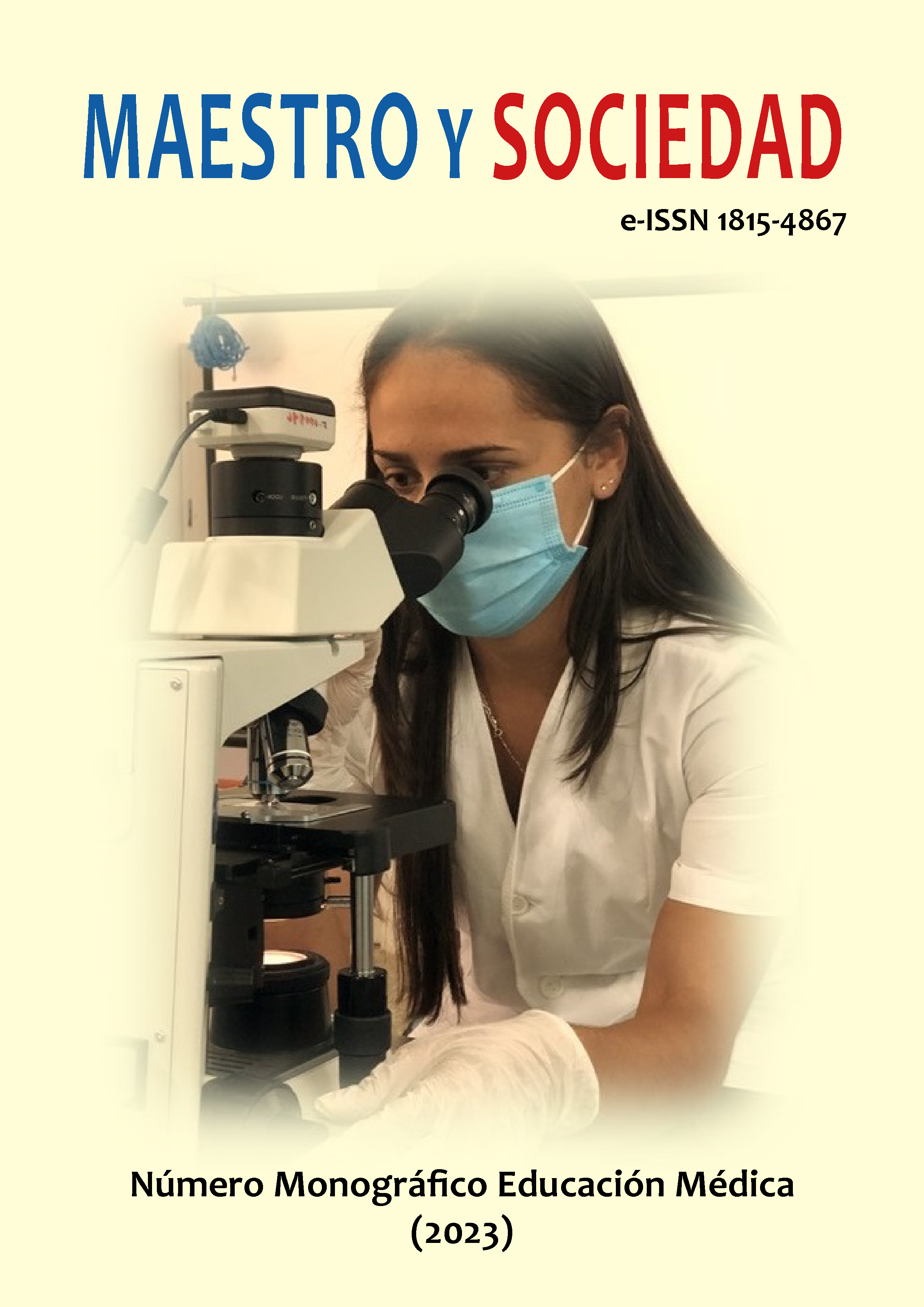Process of continuous training in healthcare ethics in the General Comprehensive Stomatologist
Process of continuous training in healthcare ethics in the General Comprehensive Stomatologist
Keywords:
trends; continuous training; ethics, assistanceAbstract
The changes that society imposes, admit the analysis of the historical-trend evolution of the process of continuous
training in ethical care in the Comprehensive General Stomatologist. The methods used; analysis-synthesis, historicallogical
and documentary review, allowed the relevance of the research in the historical development of continuous care
ethics training. Results: It is a priority of the University and the institutions to search for excellence of professionals in
educational and behavioral work before society, who consent to systematic monitoring from continuous training in the
face of social transformations, enabling the acquisition of skills and values in the historical evolution according to the
stages experienced, for the development of their specialization and the efficient treatment of patients, with a deep
knowledge of the background of the profession.
References
Bernaza Rodríguez, G. J., Aparicio Suárez, J. L., de la Paz Martínez, E., Torres Alfonso, A. M., & Alfonso Manzanet,
J. E. (2020). La educación de posgrado ante el nuevo escenario generado por la COVID-19. Educación Médica Superior,
(4). http://scielo.sld.cu/scielo.php? script=sci_arttext&pid=S0864-21412020000400015
Bonal Ruiz, R., Valcárcel Izquierdo, N., Roger Reyes, M. Á. (2020). De la educación médica continua al desarrollo
profesional continúo basado en competencias. Educ Med Súper, 34(2).
Fernández Sanabria, A., Barrabí Guardiola, N. y Pérez Martínez, L. C. (2023). La formación continua como proceso
de actualización del egresado universitario. Revista Maestro y Sociedad, 20(1), 82-88. htps://maestroysociedad.uo.edu.cu
Grau León, I., et al. (2013) Gestión curricular de la carrera Estomatología. http://www.revedumecentro.sld.cu
Hatim Ricardo, A. y Reyes Miranda, D. (2002). El Diplomado en el Sistema Nacional de Salud. Revista Médica
Superior, 18(2).
Izquierdo Hernández, A. A. (2008). Metodología para la dinámica de la superación profesional en el
sector de la salud. Repositorio de tesis en ciencias biomédicas y de la Salud de Cuba. http://tesis.sld.cu/index.
php?P=AdvancedSeachCAR&Q=YG100=1039&RP=5&SF=71SD=1&SR=10
Martínez Rodríguez, M., Ramos Romero, G., Díaz Pérez, C. A. (2018). Universidad de San Gregorio de Portoviejo.
Etapas históricas del proceso de formación en la especialidad de Estomatología General Integral en provincia Guantánamo
Revista Información Científica versión On-line ISSN 1028-993. Rev. inf. cient., 97(6).
MES. (2019a). Reglamento de la educación de posgrado de la República de Cuba. Resolución No. 140/2019.
MES. (2019b). Resolución 138. http://www.umcc.cu/wpcontent/uploads/2020/06/
Resoluci%25C3%25B3nNo.138-2019-Formaciomcontinua. doc&cd=1&hl=es&ct=clnk&gl=cu
MES. (2019c). Resolución 140. Gaceta Oficial No. 65 Ordinaria de 2019. Ministerio de Educación Superior.
https://www.gacetaoficial.gob.cu/es/capacitaci%C3%B3n
MES. (2020). Resolución 1/20 del Ministerio de Educación Superior (MES)2020
Miranda, A. (2008). Los antecedentes históricos del objeto de investigación de las investigaciones educativas.
Universidad de Ciencias Pedagógicas.
MINSAP. (2011). Programa del médico y enfermera de la familia. Actualización. MINSAP.
MINSAP. (2004a). Plan de estudios de la especialidad en Estomatología General Integral. La Habana.
MINSAP. (2004b). Reglamento del Régimen de Residencias en Ciencias de la Salud. Resolución108/2004. MINSAP.
Sosa Rosales, M. C., González Ramos, R. M., Jil Ojeda, E. (2002). Programa Nacional de Atención Estomatológica
Integral a la población. MINSAP.
Téllez-Lageyre, A., Bravo-Rodríguez, Á., Martínez, R. L., & Rodríguez-Fajardo, J. (2019). Vigencia del pensamiento
pedagógico de Fidel Castro en la formación continua del maestro primario. Maestro y Sociedad, 3-11. http://
maestroysociedad.uo.edu.cu
Published
How to Cite
Issue
Section
License
Copyright (c) 2023 Ileana María García Fajardo, Celia Teresa Ledo Royo, Luisa María Oconor Martínez

This work is licensed under a Creative Commons Attribution-NonCommercial-NoDerivatives 4.0 International License.
This journal provides immediate open access to its content, based on the principle that offering the public free access to research helps a greater global exchange of knowledge. Each author is responsible for the content of each of their articles.



























 Universidad de Oriente
Universidad de Oriente 